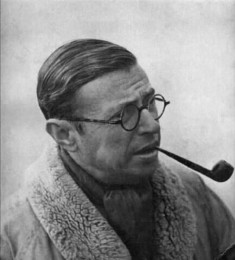| Jean-Paul Sartre | |
|---|---|
 |
|
| Philosopher | |
| Specialty | Existentialism, phenomenology |
| Born | June 21, 1905 Paris, France |
| Died | Apr. 15, 1980 (at age 74) Paris, France |
| Nationality | French |
In the play No Exit, the French playwright Jean-Paul Sartre was able to create a stunning theatrical presentation of existentialist themes within a dramatic format. While he may be known mostly for the success of this particular work, Sartre did present many other works related to his philosophy that delivered a very pronounced influence on other philosophers and creative professionals alike.
Sartre’s Early Years
Jean-Paul Sartre was born on June 21, 1905, in Paris, France. He was the son of a Navy officer and his mother was related to the Nobel Prize winner Albert Schweitzer. Sartre became interested in philosophy at a very young age when he was exposed to the work of Henri Bergson when he first read the essay Time and Free Will: An Essay on the Immediate Data of Consciousness. Sartre eventually attended the École Normale Supérieure and attained a degree in philosophy. He was heavily influenced by a number of western philosophers and thinkers and was a seminar devotee of Alexandre Kojève.
Career Years and Highlights
Sartre pursued becoming a college professor but, surprisingly, failed the requirement test the first time he took it. He gained the top score the second time he took it, but the army called on him when World War II broke out. Sartre was drafted into the French Army in 1939 and served until 1941.
The capacity in which he served was as a meteorologist. In 1940, he became a prisoner of war to the German troops. Ironically, during this time period, he was exposed to the written work of Heidegger and the writing was a huge influence on him.
When the war ended, Sartre worked out of his apartment to create the material he was most known for. He even helped establish the literary quarterly Les Temps Modernes. He also worked as a teacher following the war.
Philosophical Ideas and Thoughts
 Jean-Paul Sartre’s philosophy was heavily influenced by Marxism and the growing existentialism movement. While he did not found the movement, he gained notoriety as being one the greatest intellectual contributors to the philosophy. A great deal of his work revolved around themes of human freedom and self-expression.
Jean-Paul Sartre’s philosophy was heavily influenced by Marxism and the growing existentialism movement. While he did not found the movement, he gained notoriety as being one the greatest intellectual contributors to the philosophy. A great deal of his work revolved around themes of human freedom and self-expression.
Sartre did not believe culture was stagnant and there was to be constant growth and evolution of culture based on a number of external influences. In a sense, he was pointing out that there may always be a need to evolve with a culture as it changes in order to maintain relevancy with it.
As time wore on, Sartre became more politically active in his writings. One of the earlier criticisms about Sartre was that he was far less politically active than he should have been, considering his position as a public intellectual and an artist.
Major Works of Sartre
Jean-Paul Sartre wrote many significant works throughout his life. Being and Nothingness: An Essay on Phenomenological Ontology was published in 1943 and it helped further the existentialist movement. This was a work that centered on the existence of the human being.
Transcendence of the Ego was another one of his most revered works. The essay was one rooted in Sartre’s transference from phenomenological thinking to one that reflected his own unique perspective.
As mentioned at the outset, Sartre may be best known for his work No Exit. This was a play written in 1944 and it deals with three people who, after death, are locked in a room with one another for eternity. The play is known for its famous quote “Hell is other people,” which refers (in part) to the troubling notion that people are condemned to suffer from being viewed via the perceptions of others.
The play was a success when it first debuted and has been the consistent subject of study in schools of theater ever since.
Sartre’s Death and Legacy
Jean-Paul Sartre lived in Paris during his final years. He did publish a work that recounted the first ten years of his life that also made fun of literature movements. It was called Entitled Words. The work was considered a brilliant piece of satire. It was among Sartre’s final projects as he passed away on April 15, 1980, in Paris.